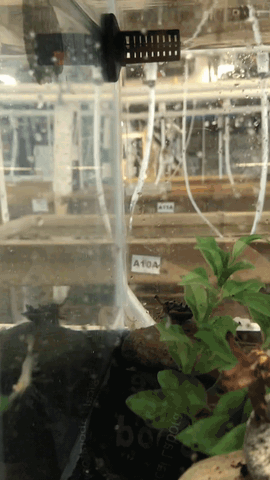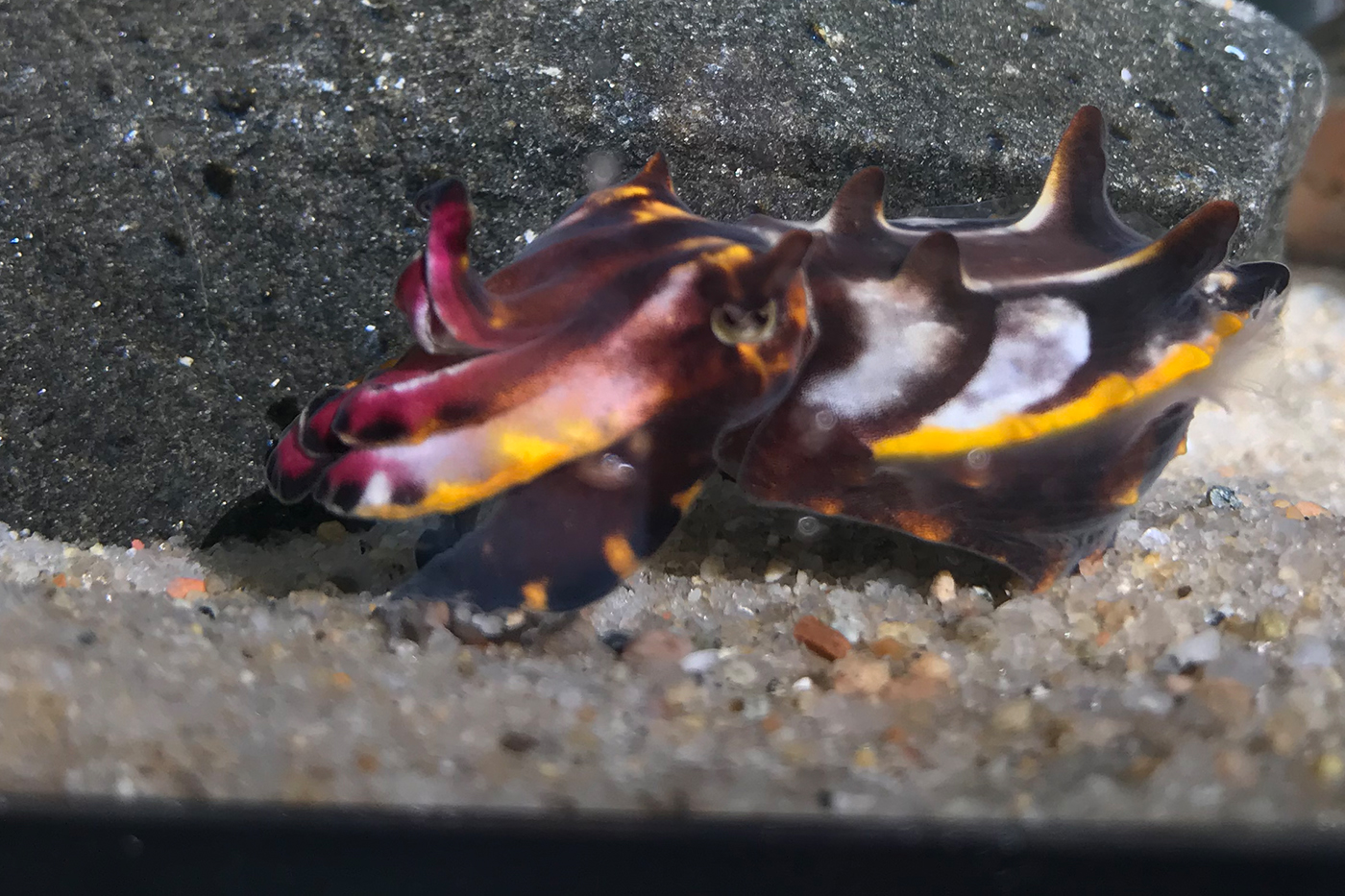Co-ops are the cornerstone of a Northeastern University education. Applying classroom lessons to real world environments can be a transformational learning experience. So how does it work during an international pandemic?
Throughout the Fall 2020 semester, we’ll be checking in with COS co-ops to find out. Read about their unique Northeastern experiences and the ups-and-downs of COVID-19 on their work, their social life, and their thoughts on the future.
Follow the series with the hashtag #COSCoop
Meet Co-op Liana Greenberg-Nielsen, Cephalopod Aquarist at the Marine Biological Laboratory
Can you tell us what a standard day is like for you working there?
Basically we start the day by coming in and checking with our supervisor and everybody else on the team. Then we go straight into our a.m. feeds.
We net shrimp and mysids for these tiny little glass shrimp that we feed out to the hatchlings and the younger animals. We go around and we feed everything. And after that, we have to feed more things!
Then we go into feeding the octopus and they’re kind of high-maintenance and they require us to clean their tanks individually and like feed each of them individually with little tweezers, and you have to cut all the shrimps heads off because they are a little more high-maintenance.
 Can you talk a bit about how COVID-19 has shaped your co-op?
Can you talk a bit about how COVID-19 has shaped your co-op?
Because of COVID, we have a capacity requirement in each room. There’s less people than normal in the miracle true room, which is where we keep most of the animals. Feeds take a lot longer than they would normally, because there’s only two of us going around feeding everything. So our mornings are consumed by a.m. feeds, feeding the octopuses, and mid day feeds. There’s a lot of animals and not enough people to get it done rapidly. So that’s definitely a thing that’s been affected by COVID.
After lunch, we go into either our own individual projects that we’ve been working on with our supervisors and the people on the cephalopod team, or we do animal moves or break down/set up new tanks for animals that are getting bigger, and regular maintenance.
Once that’s done, we go into p.m. feeds, and then our day’s over. It’s definitely separated by a lot of feeding in the morning and then more creative and individualized things in the afternoon.
What would you say is the “mission statement” of your co-op?
The goals of the cephalopod initiative, which is the project that I’m working for, is to create a new model organism that can be used by the biological community. We have drosophila (fruit flies) and we have mice and rats that we use right now as model organisms for a variety of different things.
So our goal is to create this new model organism. There are many different types of cephalopods, they all have these great aspects of their biology that would lend themselves to a variety of different uses. Their neurons are massive, compared to their size, and their brains are huge compared to the rest of their body. This makes them a lot like us. Also, we have a lot to learn about he the way they move, which may benefit soft robotics.
This will be the future of a lot of research. It’s like the research for the research.
Why did you choose to apply for this co-op? Is it different than what you expected, either because of COVID-19 or for other reasons?
I applied because the Marine Biological Laboratory just seems like a really cool place to work. It’s at the forefront of marine and biological research, so working here just seemed like a really exciting prospect for me.
The people who work here, like my boss, are just so passionate about the project. I’ve never met people more excited about what they’re doing. They’re excited to say things like ‘we’re going to count eggs for an hour.’ My boss will even say ‘I haven’t taken a day off in seven months because it’s so hard to leave.’ It’s just been really exciting to work with people that are so, so into the thing that they’re doing.
My idea for the job has changed a lot since coming in. I didn’t really realize how big a deal the project was. I thought I was going to take care of these squids, and that’s going to be really cool. I get to live in Woods Hole and it’s gonna be really interesting. I didn’t fully realize the scope of the project until the middle of the co-op. I was scrolling through my podcasts and there’s an NPR shortwave episode about the work that I’m doing. And it’s like, “Oh, okay.” This is very cool.

Can you talk about specific skills you’ve learned that might apply to the future, as well as anything that’s stuck with you from your college experience?
I had very little animal husbandry skills before coming into it. It was great because I think the team understands that if you’re coming in as a college student, you probably haven’t really been working with these weird organisms that long. So they’ve been really understanding and shown us the ropes. That’s a skill that I know will be useful in my future.
In a broader sense, I think so much of the job is problem solving. Those kind of job skills can be more important than the physical ones that you learn. I can take care of these animals, but I also learned to look at a system from an outside perspective and see what’s wrong with it, to then fix it from the inside.
Working with so many animals, do you have a favorite?
Well, the flamboyant cuttlefish are just so unbelievably cool looking. I feel like when I first came in, they were my favorite. Because they’re the flashiest. But I think as it’s gone on, I really like the squids. We have striped pajama squid, and we have hummingbird squid, and they’re just ridiculously cute. You don’t expect squids to be so cute, but they are, and they’re just so fun to watch.
Do you have any advice you can now offer from your experience?
Job postings don’t always explain or do justice to the full scope of a job. Once you’re really working in the field and learning everything, it can be so exciting and new. For me, I feel like this job is a perfect mixture of guided work and individual projects.

